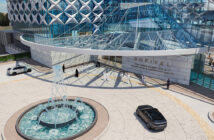Ramadan in Saudi Arabia is always special. It is not just about fasting and feasting but also about self-control, gratitude, generosity, and compassion. Ramadan has been different for the past two years because of the pandemic but now that Saudi Arabia has dropped COVID-19 restrictions, we are reminded once again of what and how it was. The spirit of Ramadan in Saudi Arabia, and the world, lives on.
The sacred month of Ramadan is just around the corner and the excitement is tangible. Streets, shops, malls, and supermarkets are shining with beautiful Ramadan decors. Houses are being cleaned, decorated, and organized for the holy month. This is a chance to recharge our faith and soul. Muslims devote most of their time in performing special prayers and reading the Quran.
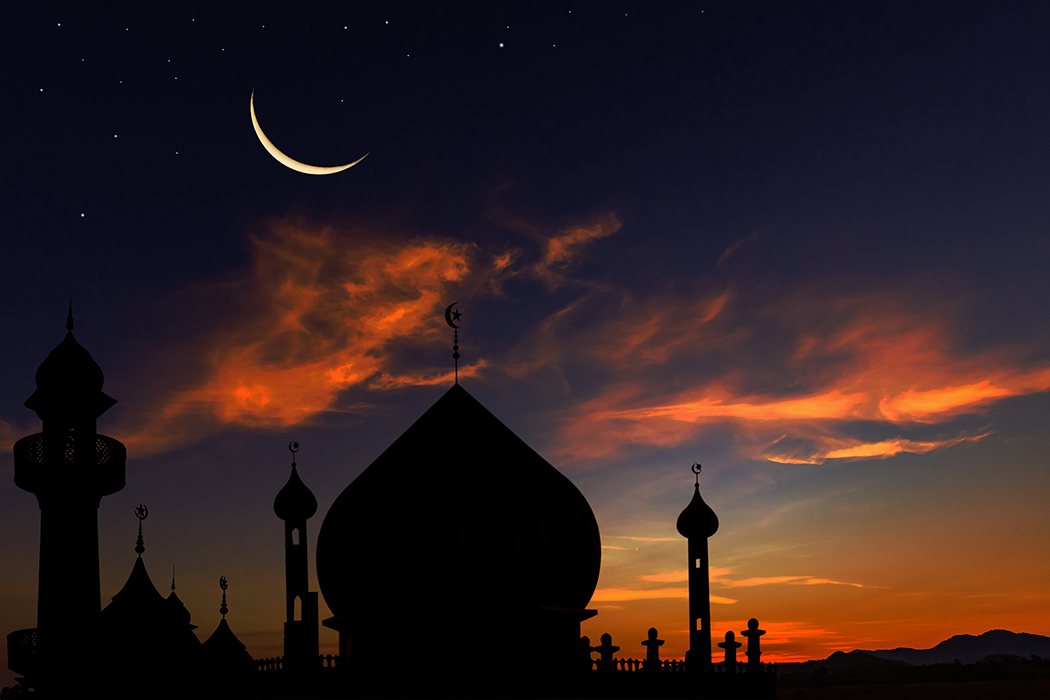
The sighting of the crescent moon marks the beginning of the holy month of Ramadan.
A Day in Ramadan
A typical day in Ramadan starts with the pre-dawn meal (Suhoor) at Fajr, extends until sunset which is when the fast is broken with a special meal (Iftar) and ends with night prayers (Taraweeh). The last ten days of Ramadan are spent in midnight prayers (Qiyam Al Layl) and it culminates into the festivities of Eid.
A characteristic meal comprises of dates, sambousas, shorba (soup), kebabs, rice or pasta, dessert, fruits and drinks. Iftar is considered incomplete without the presence of Vimto or Tang or RoohAfza! The sunset meal is a time for the entire family to gather around and eat as one. Special TV programs and series are aired during the month of Ramadan; they can be religious, historical or just plain old soap operas. After a long day of fasting, you will find families watching TV, resting or napping before they leave for the Taraweeh prayers.
Mosques and Devotion
Mosques throughout Saudi Arabia conduct the night prayers called Taraweeh. Devotees throng to mosques to get prime spots within the area for a comfortable praying experience; otherwise, you will find yourself on the pavements praying because of the crowd gathered. Either way, the joy of praying with the fellow worshippers is incomparable. Ramadan is a good time to bring out your Islamic literature to learn more about the religion and its pillars, its great personalities and their ways.
Shopping and Health
Taraweeh is usually followed by a trip to a mall, supermarket, or park. The fitness aficionados would be found at gyms and walkways. Mall timings differ during this period. Especially during the last ten days, malls are open until Fajr for people to shop. Sales and marketing departments work around the clock to cater to the needs of customers. With online shopping taking precedence in recent times, people prefer to order at home for an easier, no-hassle experience.
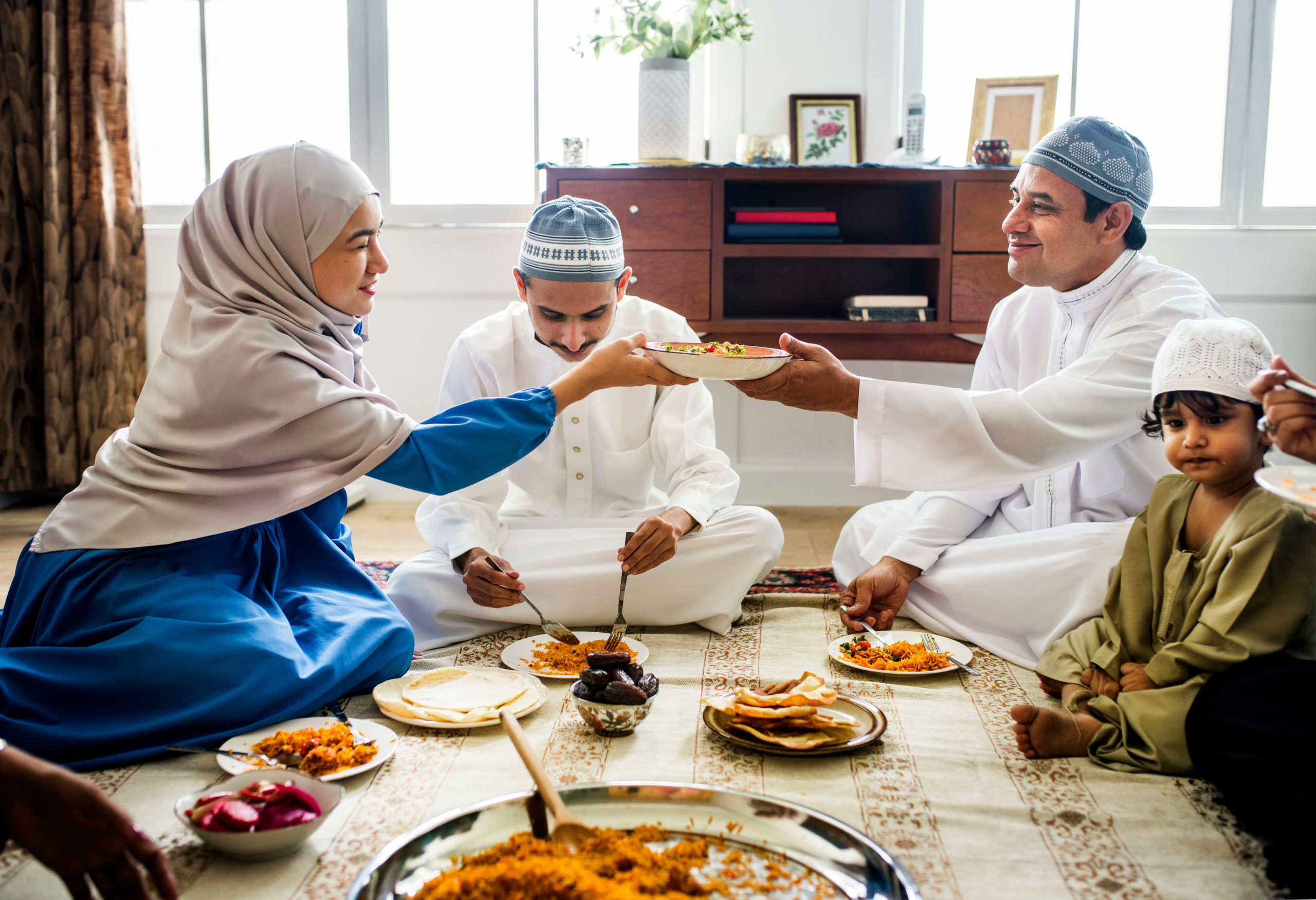
The family that breaks fast together, stays together.
Food and Socializing
Eateries and restaurants across Saudi Arabia offer Iftar deals thru the holy month. “All-you-can-eat” buffets and Ramadan tents are two examples. There are specific drinks that are prepared in Ramadan, namely Sobya (a drink made from barley and bread), Qamar Al Din (Apricot nectar), mint lemonade, and Jellab (grapes, dates, and rose water). Socializing is a component of this month. Family and friendship are given much priority. Lavish feasts are prepared and people are invited to share in the joy of eating. Iftar and Suhoor parties are a chance for the fashionistas to dress up and let their hair down. Jallabiyas, dresses, abayas in varied designs and textures are a hit during parties. Traditions and culture are at great display during these events.
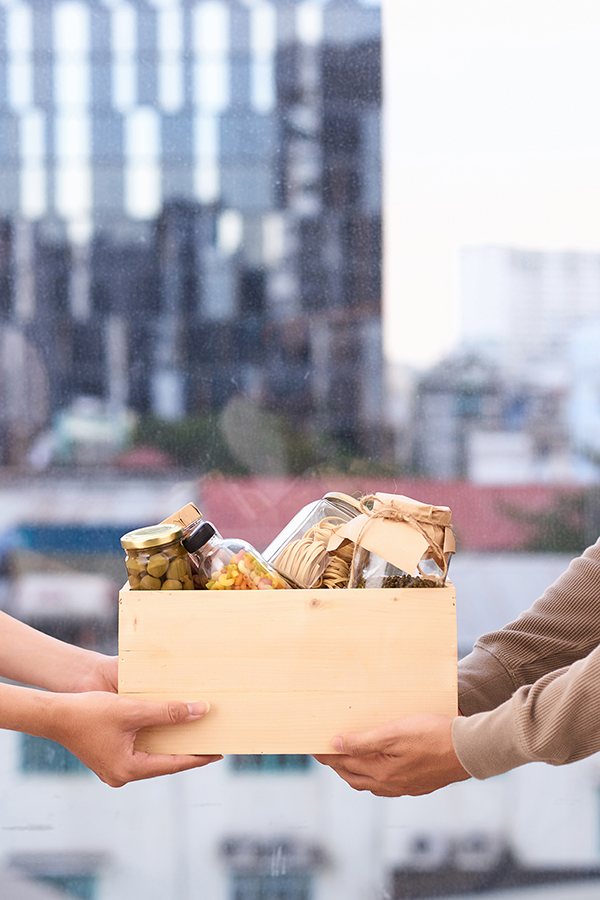
The month of generosity.
The Month of Giving
Charity is given utmost importance during the holy month. Apart from the mandatory Zakat Al Fitr, Muslims are extremely generous during this month and charity drives are organized throughout. Food packets and boxes are distributed to underprivileged families. Clothes and toys are collected and sorted to be distributed within the city and to people in impoverished countries. Generosity, compassion are the branches of this beautiful month. After all, kindness and smiles are emotions to be spread around. Consider donating to the following organizations: https://www.ksrelief.org/ and https://www.mealsofmercy.org/
Family Nights
This is a staple during Ramadan with family and friends gathering post-Taraweeh for games and food. Carrom boards, playing cards, and Monopoly some common games played at night. Trivia games such as Trivial Pursuit and Darussalam’s Quran Quest are recent Ramadan obsessions. Game nights usually extend till suhoor. Activities and events can also be done outdoors and we have the perfect suggestions for you in the following pages of this issue of DQ Living.
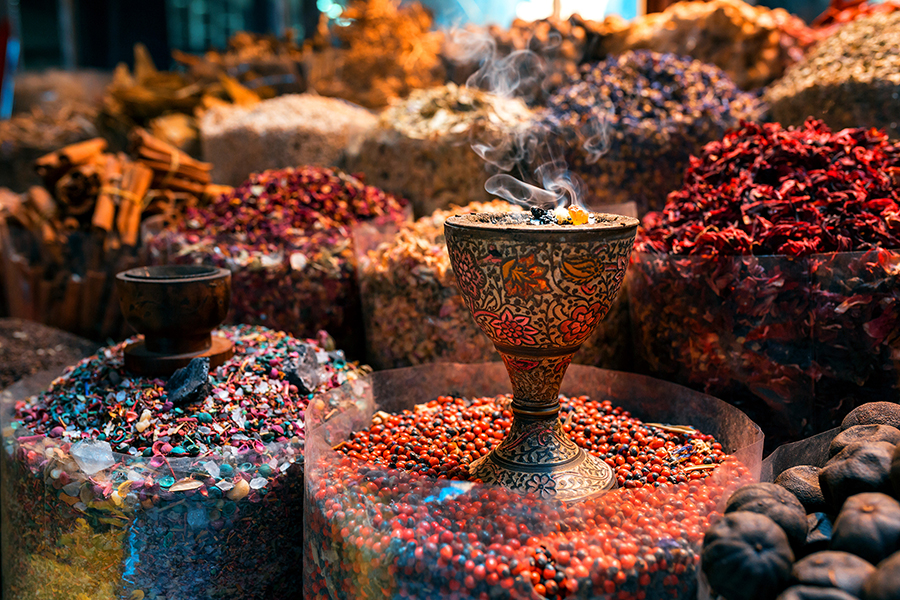
Oud and bukhoor make homes and bazaars fragrant.
Local Markets
The local markets in Saudi Arabia come alive during this month. The streets of Balad in Jeddah, and Deerah in Riyadh are lit up with traditional Ramadan lanterns and vendors bring their wares to the streets. Food trucks, fragrance, toys, and clothes are sold with customers bargaining stringently for them. Many visit oud shops, traditional sweet markets and gift shops as Eid comes closer.

An umrah in Ramadan is equal to performing Hajj.
Visiting the Two Holy Mosques
The pious gather at the two holy mosques in Makkah and Madinah for breaking their fasts, for Taraweeh prayers and Qiyam al Layl-the night prayers that take place during the last ten days of Ramadan. Special arrangements are made by the authorities for iftar in the premises with long sufras (plastic table covers) being spread for the devotees. Food boxes are distributed amongst the worshippers before sunset. One will also find locals distributing homemade food packs.
Ramadan traditions are many and varied. They differ by country, tradition, culture and ethnicity but what binds it all is the purity and benevolence of the month. The calm and joy of Ramadan is incomparable. May the beauty and peace of Ramadan encompass every person worldwide. Wishing our dear readers, Ramadan Mubarak!


